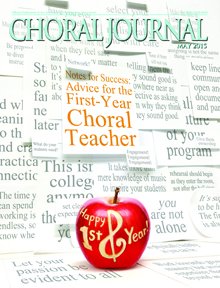In May, August, and September 2015, the Choral Journal featured a three-part article series titled “Notes for Success: Advice for the First-Year Choral Teacher.” As part of the series, 11 choral conductors with teaching experience ranging from 4 to 34 years answered 10 questions related to setting expectations for your first year, classroom management, balancing a successful work and home life, finding repertoire, and more.
This column will address Question #2: Classroom Management
What do I do with difficult students? How do I handle difficult classroom situations?
A portion of the suggestions listed regarding this question are below. Read the rest of the article in the May 2015 issue of Choral Journal by going to acda.org/choraljournal. Click “Search Archives” and choose May 2015 from the dropdown options.
________________
“Come up with a plan before day one of class starts. Know how you want rehearsal to flow and why in that order. Sometimes you will have problems with the rehearsal or your classroom management, so do not be afraid to ask a colleague or administrator to come observe your class; you can also videotape yourself, as I have done many times. – Elizabeth Batey
“I always begin the year with my expectations known and a high standard for my classroom. When it comes to rehearsals, I like to get started right away, even before the bell rings. A few years ago, I started requiring my students to begin a music journal. I write music-related writing prompts on the board for students to reflect on the minute they get into the classroom. This gets them thinking about music before we even sing the first note, and it allows me time to take attendance and answer any questions individually.” – Desiree Bondley
“Questioning and discussion can be a great rehearsal strategy to engage students in their own learning. For example, you can ask students, “What did we work on at the last rehearsal?” “How can we improve that phrase?” “How might we solve this musical challenge?” “What do you think we need to work on?” Ask students to review their own rehearsals and performances and the performances of others. These reviews can be in the form of a written prompt or in class discussion… In addition to the benefits in the classroom, questioning and discussion techniques are frequently included as a category in teacher evaluations.” – Jennifer Sengin
“We want our students to apply their best effort by their own choice, doing so because they want to learn and succeed. We can help this occur by 1) only asking students to do meaningful work—that is, work that has recognizable value to them and their future; 2) encouraging autonomy or ownership by teaching students transferrable skills and providing opportunities for them to put these skills into practice (i.e., allowing students to be responsible for their own learning and progress); and 3) reinforcing student efforts by praising the inherent value of the improvement (rather than complimenting the student for complying or pleasing you, highlight how the action is beneficial to the student)… The best way to engage students is to ask questions, allow time for them to talk, and keep them active.” – Philip Silvey
Read the rest of the posts in this series on ChoralNet here.
And please share this post and Choral Journal article series with those who will be starting their first year of teaching this coming fall!



Leave a Reply
You must be logged in to post a comment.